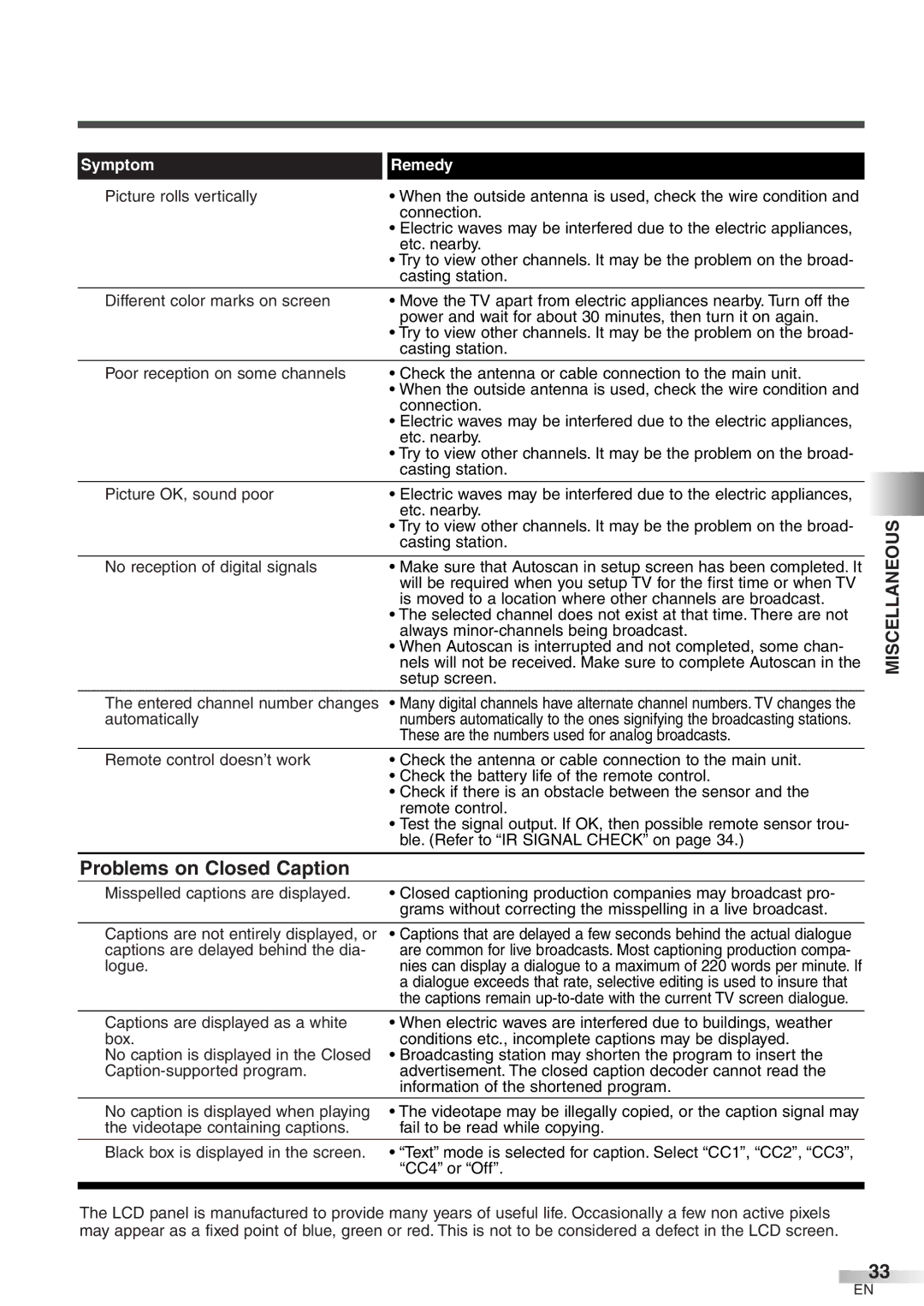
Symptom |
| Remedy |
Picture rolls vertically |
| • When the outside antenna is used, check the wire condition and |
|
| connection. |
|
| • Electric waves may be interfered due to the electric appliances, |
|
| etc. nearby. |
|
| • Try to view other channels. It may be the problem on the broad- |
|
| casting station. |
Different color marks on screen |
| • Move the TV apart from electric appliances nearby. Turn off the |
|
| power and wait for about 30 minutes, then turn it on again. |
|
| • Try to view other channels. It may be the problem on the broad- |
|
| casting station. |
Poor reception on some channels |
| • Check the antenna or cable connection to the main unit. |
|
| • When the outside antenna is used, check the wire condition and |
|
| connection. |
|
| • Electric waves may be interfered due to the electric appliances, |
|
| etc. nearby. |
|
| • Try to view other channels. It may be the problem on the broad- |
|
| casting station. |
Picture OK, sound poor |
| • Electric waves may be interfered due to the electric appliances, |
|
| etc. nearby. |
|
| • Try to view other channels. It may be the problem on the broad- |
|
| casting station. |
|
|
|
No reception of digital signals |
| • Make sure that Autoscan in setup screen has been completed. It |
|
| will be required when you setup TV for the first time or when TV |
|
| is moved to a location where other channels are broadcast. |
|
| • The selected channel does not exist at that time. There are not |
|
| always |
|
| • When Autoscan is interrupted and not completed, some chan- |
|
| nels will not be received. Make sure to complete Autoscan in the |
|
| setup screen. |
The entered channel number changes |
| • Many digital channels have alternate channel numbers. TV changes the |
automatically |
| numbers automatically to the ones signifying the broadcasting stations. |
|
| These are the numbers used for analog broadcasts. |
|
|
|
Remote control doesn’t work |
| • Check the antenna or cable connection to the main unit. |
|
| • Check the battery life of the remote control. |
|
| • Check if there is an obstacle between the sensor and the |
|
| remote control. |
|
| • Test the signal output. If OK, then possible remote sensor trou- |
|
| ble. (Refer to “IR SIGNAL CHECK” on page 34.) |
|
|
|
Problems on Closed Caption |
|
|
Misspelled captions are displayed. |
| • Closed captioning production companies may broadcast pro- |
|
| grams without correcting the misspelling in a live broadcast. |
|
|
|
Captions are not entirely displayed, or |
| • Captions that are delayed a few seconds behind the actual dialogue |
captions are delayed behind the dia- |
| are common for live broadcasts. Most captioning production compa- |
logue. |
| nies can display a dialogue to a maximum of 220 words per minute. If |
|
| a dialogue exceeds that rate, selective editing is used to insure that |
|
| the captions remain |
|
|
|
Captions are displayed as a white |
| • When electric waves are interfered due to buildings, weather |
box. |
| conditions etc., incomplete captions may be displayed. |
No caption is displayed in the Closed |
| • Broadcasting station may shorten the program to insert the |
| advertisement. The closed caption decoder cannot read the | |
|
| information of the shortened program. |
No caption is displayed when playing |
| • The videotape may be illegally copied, or the caption signal may |
the videotape containing captions. |
| fail to be read while copying. |
Black box is displayed in the screen. |
| • “Text” mode is selected for caption. Select “CC1”, “CC2”, “CC3”, |
|
| “CC4” or “Off”. |
|
|
|
|
|
|
The LCD panel is manufactured to provide many years of useful life. Occasionally a few non active pixels may appear as a fixed point of blue, green or red. This is not to be considered a defect in the LCD screen.
MISCELLANEOUS
33
EN
